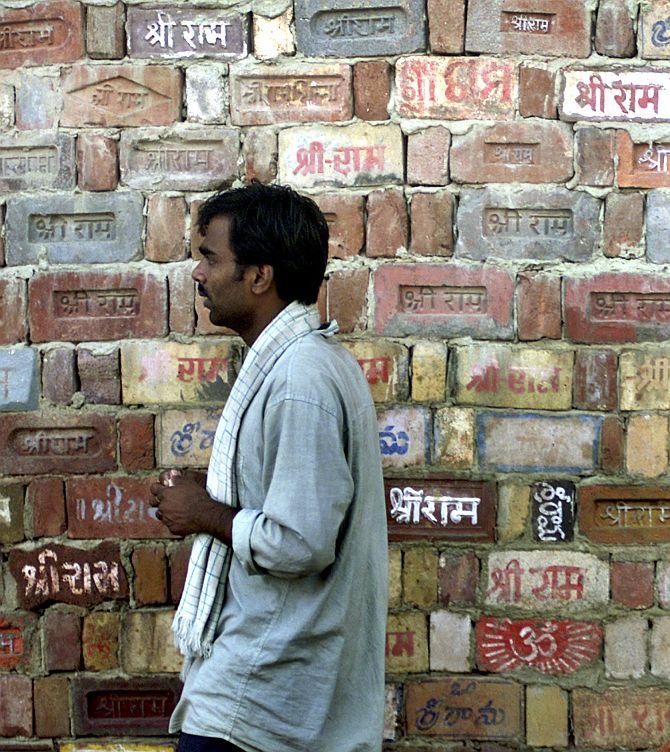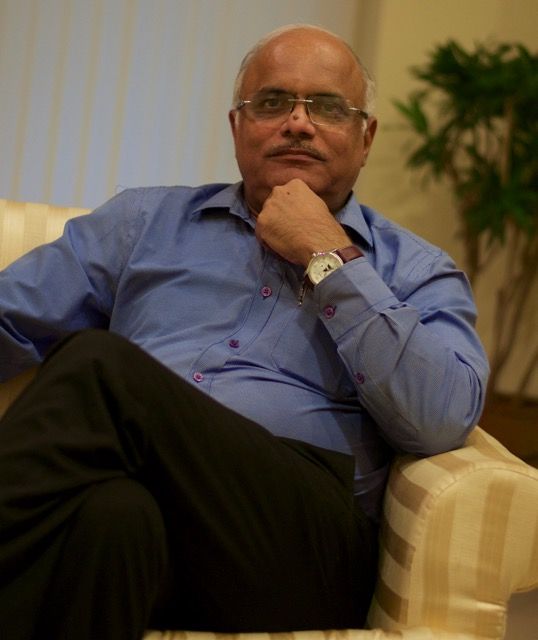'We never looked at the Common Civil Code or the Ram Mandir from a narrow electoral outlook or treated them as electoral planks.'
Uttar Pradesh appears to top the agenda of Rashtriya Swayamsevak Sangh-Bharatiya Janata Party discussions these days.
The RSS top brass -- including Sarsanghchalak Mohan Bhagwat, Sarkaryavah Suresh 'Bhaiyyaji' Joshi and 41 regional pracharaks -- will meet in Kanpur from Tuesday, July 12, for discussions on the coming elections in four states.
According to sources, a strategy will be chalked out to ensure the BJP's victory in the elections at the RSS meeting.
BJP Vice-President Vinay Sahasrabuddhe, below, left, who was recently elected a member of the Rajya Sabha from Maharashtra, spoke with Rediff.com's Prasanna D Zore about next year's assembly election in Uttar Pradesh and the BJP's testy relationship with its ally, the Shiv Sena, in Maharashtra.

Will the Ram Mandir as well as the Uniform Civil Code, considered 'core issues' for the BJP be part of the party's Uttar Pradesh election campaign?
We have made it amply clear, not once, but several times, that these particular issues and certain other issues as well, have been a part of our basic philosophical approach. We never looked at them as election issues.
We never looked at the Common Civil Code or the Ram Mandir from a narrow electoral outlook and treated them as electoral planks.
They definitely become electoral issues when many of our opponents continue to rake them up to embarrass us and to strengthen their own vote-bank.
But for us these issues are basic tenets of our world-view and therefore they are a part of our commitment.
Whether they will become election issues or not is too early to tell because it is majorly our Opposition parties who are trying to cash in on these issues.
People have now seen through their design and therefore voters are no more going to be hoodwinked by their vote bank politics.
People these days are keener about development and development is going to be a major plank in the forthcoming elections in Uttar Pradesh. As per my understanding development also involves social and cultural justice and security as well.
But there is a charge against the BJP that the party rakes up these issues only before the elections. How are you preparing to blunt this criticism?
These are frivolous criticisms and as a party I don't think they merit any serious consideration. These have no substance in them.
People know what the BJP today stands for and are convinced about our commitment to development and welfare of every Indian.
They do not see any contradiction in issues of these kinds as our basic ideological position encompasses both, social and cultural identity as well as developmental aspirations.
Development is about better living, which means 'how to live?'
On the other hand, socio-cultural aspirations are about 'why to live?' Are not both these issues important?
While the BJP came to power chanting slogans like 'Congress-mukt Bharat', now even the BJP's regional allies, particularly the Shiv Sena in Maharashtra, have started fearing the BJP, and the distance between the two allies is only increasing as we head towards the BMC (BrihanMumbai Municipal Corporation) elections next year?
I don't think our alliance partners have any apprehensions about the BJP and its politics. They are our partners for decades.
Our slogan for a 'Congress-mukt Bharat' should in fact embolden our allies as they also are going to benefit from it.
Our slogan is an example of using minimum words to convey maximum substance.
We want this land to be free from nepotism, corruption and ill governance.
Ever since Independence these three words best describe the functioning and character of the Congress party.
Instead of using these three terms we are using one term: Congress-mukt Bharat. That is the sum and substance of it.
In any alliance, partners have to realise the changes on the ground and prepare for some give and take.
In 1996, we sacrificed our Thane Lok Sabha seat as we had realised that the Shiv Sena had increased popular support. Twenty years thereafter, if the situation has changed and the BJP has increased its popular support.
Now it is for our partners to realise this and be prepared for give and take as per the changed situation.
Since 2014, the political map of Maharashtra has undergone changes. Therefore, if alliance partners don't revisit their plans as per the changed political geography, then some kind of confrontation is only natural.
If they appreciate this ground reality (that the BJP won more seats in the Maharashtra assembly) then I don't think there should be any problem.

Editorials in the Shiv Sena newspaper Saamna label the BJP an opportunistic party, 'big brother'...
Our main alliance partner in Maharashtra (the Shiv Sena) was our big brother earlier. Even now they continue to not only criticise, but also ridicule the BJP leadership every now and then.
I really fail to understand as to how the BJP could be blamed for the so-called big bBrother approach. For decades their mouthpiece has criticised the BJP using abusive terms.
Some leaders (from the Shiv Sena) also ridiculed calling us 'Kamalabai' and this not in the too distant a past. We decided to ignore it or take it in a sporting spirit.
Remember, the BJP has always respected independent political space of our partners.
After all, every alliance continues only because the partners in the alliance believe -- equally seriously -- that they need each other.
If you stop believing in this, then naturally the alliance will go haywire.
Do you think the BJP-Shiv Sena alliance can be saved for the BMC elections or is a split a strong possibility now?
The BJP has made its position very clear. We have left the decision to our local units. It is for them to take a call.
If an alliance partner behaves in a particular manner and goes along with the 'alliance dharma', as such I think the alliance could certainly happen.
But if they don't, then perhaps the alliance may not happen.
Saving the alliance is a shared responsibility.










